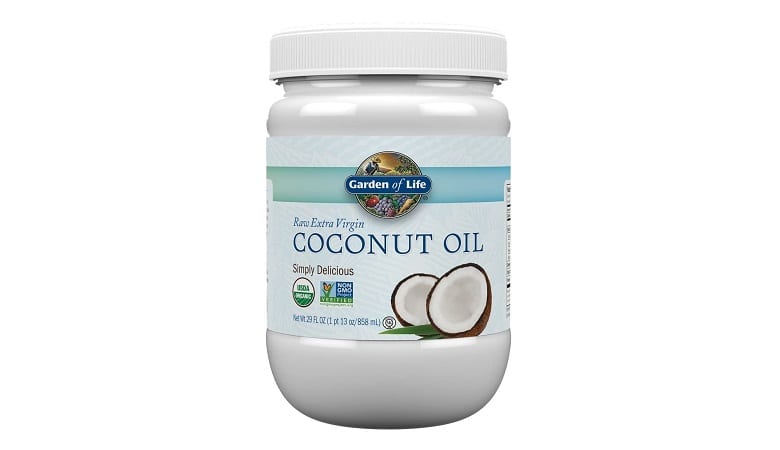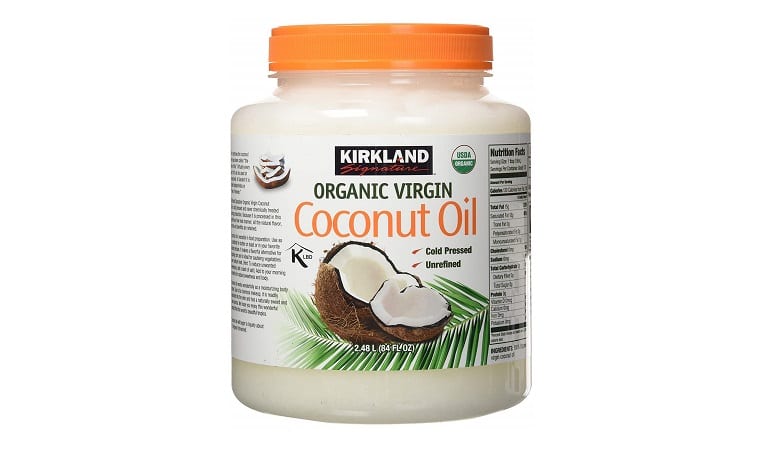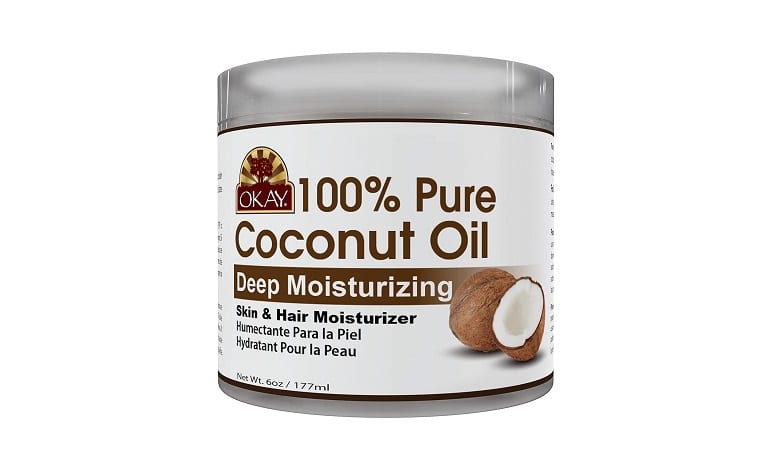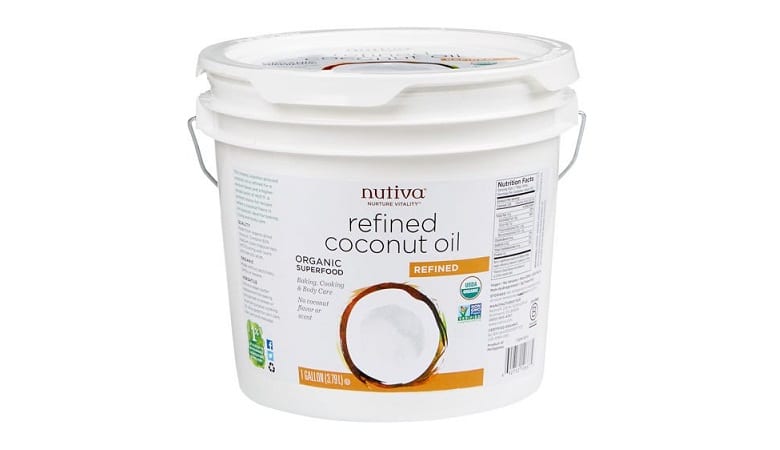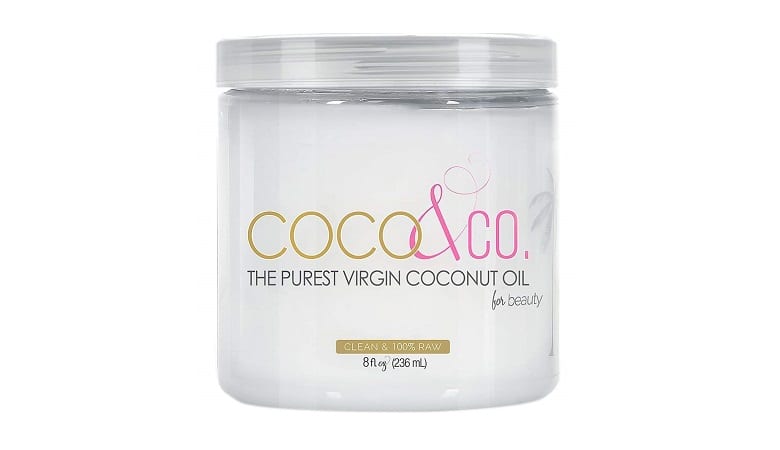Rank: | Photo: | Model: | Rating: | More Info: |
#1 | BEST OVERALL Garden of Life Coconut Oil | |||
#2 | Kirkland Organic Virgin Coconut Oil | |||
#3 | Okay Brand 100% Pure Coconut Oil | |||
#4 | Nutiva Refined Coconut Oil | |||
#5 | Coco & Co. Organic Pure Extra Virgin Coconut |
You’ve used moisturizers, skin peels, and hydration options as far as the eye can see.
Nothing worked. Do you know why?
They include chemicals, and yes, I mean even the good ones. You don’t have to have sensitive skin to not absorb or be indifferent towards certain fillers in moisturizer products.
If nothing works, or if you just want to switch to something that’s better for your skin, you can’t go wrong with coconut oil.
Designed by nature and inherently good for anyone’s skin, coconut oil is a miracle skincare product that doesn’t require chemical alterations or major processing to be powerful. It’s just amazing.
Today, we’re going to go down a list of the five best coconut oils for your skin, and answer your burning questions surrounding maintenance, storage, and just why coconut oil is so good for your skin.
Best Coconut Oil – Reviews & Buying guide for 2021
Best Overall: Garden of Life Coconut Oil
- Size: 29 fl oz
- Type: Extra Virgin
Coconut oil is one of the best things for your skin, but only when it’s sourced properly and not tampered with. Nobody understands that better than Garden of Life – the best coconut oil for skin on the market.
You get just under thirty fluid ounces for a fair price, but based on how they treat their coconut oil, they could be charging more (thankfully they’re not). There’s nothing special about the packaging; just a basic plastic jar similar to what synthetic coconut oil would come in.
But inside, you don’t just get the best coconut oil for your skin, but the best coconut oil for hair use as well. Garden of Life made sure this pure coconut oil is chocked full of MCTs – an enzyme that’s commonly lost during heating of synthetic or overly processed coconut oil.
They do their best to maintain all the MCTs during the natural cold press method of extraction.
In total, there’s fifty-seven servings in here (if you’re cooking). What that translates to for your skin is about four months worth of applications, or about three if you’re also going to use some in your hair from time to time.
Garden of Life offers two other sizes, so if you want to try their fourteen ounce jar to see if you fancy them, you can give that a shot. Keep in mind that when you get this shipped out, the melting temperatures of this virgin, cold-pressed coconut oil are not as high as you might guess.
If you’re buying coconut oil for your skin in summer, it might be best to bulk up on a few months’ worth towards the beginning of the season.
Last but not least, Garden of life did an excellent job making sure that the cold-pressed coconut oil doesn’t come out runny, but it’s also stiff enough to create peaks in the container that ensure it’s being stored properly.
When you’ve gone through over a dozen brands and jars of coconut oil (like we did for testing), the brands that really care about their product shine through, and that’s exactly what Garden of Life is like.
Runner Up: Kirkland Organic Virgin Coconut Oil
- Size: 5.2 lbs
- Type: Virgin
We all know Krikland for one reason or another (for me, it’s usually coffee), but now you’re about to know them for a whole new reason: skincare.
Kirkland has this fantastic coconut oil that comes in a 5.24 lb jar, and as we know Kirkland certifies its products and tries to make as many of them organic as possible.
They conjure up some of the best coconut oils as a result, ensuring that their organic virgin coconut oil is cold-pressed and completely unrefined. Everything you get in the jar is as close to nature as possible, keeping every vitamin intact and ready to nourish your skin.
Kirkland packages this similarly to how every other major brand does, but the plastic not UV-light blocking. Do not leave this on the counter where direct sunlight can affect it.
In our experience, Kirkland was also the best coconut oil for oil pulling. If you’re unfamiliar with oil pulling for your skin, it’s not the most pleasant process (5-20 minutes of swishing unrefined coconut oil around in your mouth), but compared to other brands, Kirkland was the most palatable.
They keep everything transparent and ensure the entire process is chemical-free. Kirkland is also USDA certified organic by OneCert, and comes to them from direct sources in either Vietnam or the Philippines.
Basically, it’s everything you want in organic coconut oil for your skin and for consumption.
Alternative: Okay Brand 100% Pure Coconut Oil
- Size: 6 oz
- Type: Pure (for dry skin)
Now this is a brand that we’re willing to bet you haven’t heard of. This is as premium as it gets.
You’re not getting out of this for cheap, but the thing is, this is designed specifically for hair and skincare use. Okay Brand is able to ensure 100% pure coconut oil, but keep in mind that it doesn’t say organic.
It says pure, but doesn’t talk about it being organically sourced. That being said, the only major difference here that we can feel between this and certified organic coconut oil is the consistency.
This appears to be more whipped, which could show some refinement, but there just isn’t enough information to really know. It spreads through your hair and onto your skin nicely as a result, though, so it’s definitely more user-friendly if you don’t like the feeling of oil being on your skin for too long.
Skincare is important, which is why we’re confident in saying that Okay Brand is the best coconut oil for baby skin use because of how fast it soaks into the skin.
Your baby won’t be able to scrape this off of their skin by flailing around since it will already begin to soak through their pores upon first contact.
Is it the best coconut oil brand?
Almost. Okay Brand has plenty of benefits to its vitamin E-enriched coconut oil, it just might contain slightly fewer vitamins (PPM) than their competitors. That being said, it’s still a fantastic buy, and the buttery texture of the whipped coconut oil goes into your hair and onto your skin beautifully.
Alternative: Nutiva Refined Coconut Oil
- Size: 1 Gallon
- Type: Refined
Do you need an entire gallon of coconut oil?
You might, if you want that skin to say silky soft and smooth. Nutiva offers an insane value on this miniature drum of coconut oil, but as you might imagine, there’s a reason that they’re the fourth spot on our top five list.
This is refined, which is less awesome for your skin than unrefined coconut oil, but still in the ranks of the best skin moisturizers out there.
With this refined coconut oil, you get a more slick, easily-spreadable formula as opposed to unrefined coconut oil. The reason we chose Nutiva despite being refined is because they keep a strict practice that complies with healthy skin requirements.
The benefits of coconut oil begin to wane the more it’s processed. Nutivsa may have refined this, but it was done gently with a non-hydrogenated procedure, and without including any GMO products whatsoever.
In fact, this is entirely organic – it’s only a smidgen less powerful for your skin than unrefined coconut oil. It’s why they can charge similar prices to unrefined coconut oil brands.
Speaking of which, that’s why they’re on this list. This is an expensive refined coconut oil, but because it’s organic, you’re still getting more benefits than any other refined oil on the market.
Coconut oil benefits don’t disappear entirely from refinement. Nutiva also gets bonus points for the storage container that this comes in. One of the biggest issues with most coconut oil containers (virgin or otherwise) is that they don’t use UV-light blocking materials.
This tub has a thick, tight lid to seal everything in and prevent oxidation, and the sturdy white plastic doesn’t allow UV light in, either. This is meant to be stored in the pantry.
Last but not least, it’s important to know that the container weight (remember: thick, sturdy plastic) is included in that one gallon weight.
That being said, ounce-to-dollar wise, you’re still getting a good deal on this coconut oil. Just don’t plan out every meticulous teaspoon that you plan on using, otherwise you’ll fall a bit short.
Alternative: Coco & Co. Organic Pure Extra Virgin Coconut
- Size: 8 fl oz
- Type: Extra virgin
There’s a lot of hype in the skincare game, and part of our job on this site is to dispel it when we see it.
You’re trying to get the best products, not the best feeling that a product sells to you. Coco & Co. makes a truly remarkable virgin coconut oil, but their tagline, “The Purest Virgin Coconut Oil” doesn’t have any empirical data to back it up.
Even if it did, it’s impossible to register it against all the information that other virgin coconut oil producers are able to find on their own oils. So why does this still slide on our list?
Because when you get past that and have reasonable expectations for the product, you’ll know that it works wonders. You get a total of eight fluid ounces in this container, and for the price, that’s not a lot. This is a premium version of virgin coconut oil, make no mistake.
It applies smoothly to your skin and through your hair, and overall just feels really nice on your skin no matter what.
The only downfall here is that you’re using a teaspoon-sized amount for your entire body (sometimes more depending on preferences), and that means Coco & Co. isn’t going to last very long at just eight ounces.
This isn’t something we would recommend you use for coconut oil pulling.
It is ingestible, but this has been designed and treated to be applied to your skin. It will absorb too quickly into your saliva glands to really be viable for oil pulling. Apply it to your skin, watch it soak up immediately, and feel the tightening benefits right then and there.
Coconut Oil FAQ
What Kind of Coconut Oil is Healthiest?

Organic coconut oil is the healthiest, often referred to as virgin coconut oil. This is unrefined, cold-pressed coconut oil. It doesn’t look ultra smooth or have a creamy consistency like some coconut oil products do: it’s raw, and it’s better that way (for your skin).
If you’re wondering why it’s better, these are the reasons:
- Antibacterial Properties: Raw coconut oil has a higher concentration of lauric acid, an antifungal and antibacterial element. Lauric acid can help break down bacteria on the surface of your skin that causes infections, dry skin patches, and other issues.
- Inflammation Reduction: Inflammation is a pain in the rear end, and when your skin is inflamed, it doesn’t look its best. You can quell those issues with virgin coconut oil, which contains C-reactive protein to help from a surface standpoint, but also through consumption.
- Mineral Rich: Refining coconut oil takes some of the nutrients and vitamins out of it that your skin so desperately needs. Yes, refined coconut oil can still be good for your skin, but nowhere near as good as unrefined, raw coconut oil.
Refined coconut oil can also cause slight allergic reactions on the skin thanks to hydrogenation.
This is the process of hydrogen being added in to make something more solid (hence why synthetic/refined coconut oil melts at a higher temperature than organic, raw coconut oil). While refined coconut oil can still be good for your skin, it’s noticeable less so.
What is the Difference Between Virgin Coconut Oil and Coconut Oil?
Not sure what the differences are just yet?
They can be hard to spot, but basically, you’re looking at a smoother, waxier consistency from refined coconut oil versus a more oil-rich feeling from unrefined coconut oil.
With refined coconut oil, it’s imbued with a chemical known as hexane. This helps the coconut oil extraction process, where the oil bleaches and goes through heat extraction.
The problem here is that nutrients and living enzymes in raw coconut oil – basically, all the good stuff about it – gets obliterated and actually lowers its quality.
With raw, unrefined coconut oil, you’re not dealing with bleach, colorings, or deodorizers (yes, those get added into refined coconut oil as well). It’s less harmful to your skin, and contains those living enzymes that actually boost your skin’s health.
How Can You Tell if Coconut Oil is Pure?
Virgin coconut oil can be double the cost of standard coconut oil, and nobody wants to pay those prices only to not receive their product in the way they wanted.
Truth be told, a lot of people can’t tell the difference between pure coconut oil, so let’s take a look right now at how you can spot the key differences.
The Scent
Pure coconut oil has a non-oxidizing blend of vitamin E. What this means is that the scent is preserved without needing cleansing.
The light, coconut scent lingers as long as there’s vitamin E present (and if you have any pure coconut oil left, there’s vitamin E remaining).
Synthetic coconut oil will lose its scent over time due to a bleaching process, but oddly enough, synthetic coconut oil has a stronger scent right out of the bottle.
Temperature Check
If you buy coconut oil, it should melt around 77°F.
Anything lower than that, and it should be nice and solid. The easiest way to check if your coconut oil is synthetic or pure is to gradually increase the heat around it until you’re peaking around 76°F to 78°F, and watch how it changes (or how it doesn’t change).
Synthetic coconut oil has a higher melting point of around 82°F to 84°F
Flavor
This is edible (and fantastic for you). Take a small amount and melt it between your tongue and the roof of your mouth. If you’re getting an overly sweet flavor like coconut flakes or shreds used for baking, it’s synthetic.
Natural coconut is sweet, but nowhere near as intense. If you have a lot of processed sugars in your diet, you may not be able to tell the difference other than virgin coconut oil simply being less sweet.
Should I Refrigerate Coconut Oil?
You don’t have to. In fact, if you’re using it for your skin, it might be better to keep it in the pantry or on a shelf instead of any refrigerated area.
Coconut oil stiffens up pretty hard, even when it’s stored in a container on the shelf. You have to work it into a smoother consistency, and when it’s coming out of the fridge, that task is going to be even more difficult. Besides, nobody wants chilly oil on their skin.
There is no risk of your coconut oil going bad if it’s stored in the cabinet, which is the number one reason that people (think) they’re supposed to refrigerate coconut oil in the first place.
Your coconut oil still needs to be stored in a safe space, though. Coconut oil manufacturers usually don’t have UV-blocking bottles or containers, and they’re extremely important.
Leaving your coconut oil out on the counter can not only result in it melting from direct heat through sunlight, but the UVA rays can penetrate the container and actually break down the consistency of the coconut oil. It can essentially ruin it.
You don’t need the fridge, you just need to store it intelligently so it isn’t rendered useless.
Can I Use Coconut Oil for Cooking on My Skin?

For all intents and purposes, they’re the same thing. The only issue is that synthetic or processed coconut oil is generally better for baking and cooking because of its high smoke threshold (the point where heat begins to burn the oil and turn it to smoke).
You can use raw, unrefined coconut oil in cooking, but it’s definitely better for your skin. To benefit from using raw coconut oil in cooking is that you ingest a lot of the benefits that may not get absorbed through your skin.
But rest assured: if you bought organic coconut oil for cooking, it can go on your skin. Synthetic can as well, it’s just not going to do the same job.
What Does Cold-Pressed Mean?
When coconut oil is processed – and do keep in mind that all coconut oil is processed to some extent – you have two pathways you can take. You can stretch the amount of coconut you get by turning it into synthetic coconut oil, or a non-pure version of coconut oil.
This still contains plenty of coconuts, but it’s been bleached and loses some of its aroma.
With cold-pressed coconut oil, the processing doesn’t raise the temperature of the coconut oil past 120°F (in most cases), so you don’t alter the form of the oil. In fact, it negates the need to incorporate chemicals into it at all, but it also raises the price.
Cold-pressed is processing without reaching over a temperature that changes the fundamental state of the product. This is better at preserving MCTs and other nutrients in coconut oil, so you end up with better nutrition for your skin right from the start.
Coconut Oil is a Miracle for Skin
Coconut oil is one of the best things that you could ever put on your skin. That is, if you know the ins and outs of how to choose the right brand, and whether or not you need virgin or standard coconut oil.
With antioxidants, moisturizing properties, and nutrients for your skin, coconut oil is absolutely fantastic to soften and hydrate your skin. If traditional moisturizer mixes just can’t cut it for you, you’re not alone; it’s time to join the ranks of everyone else that uses this as their secret skincare weapon.

